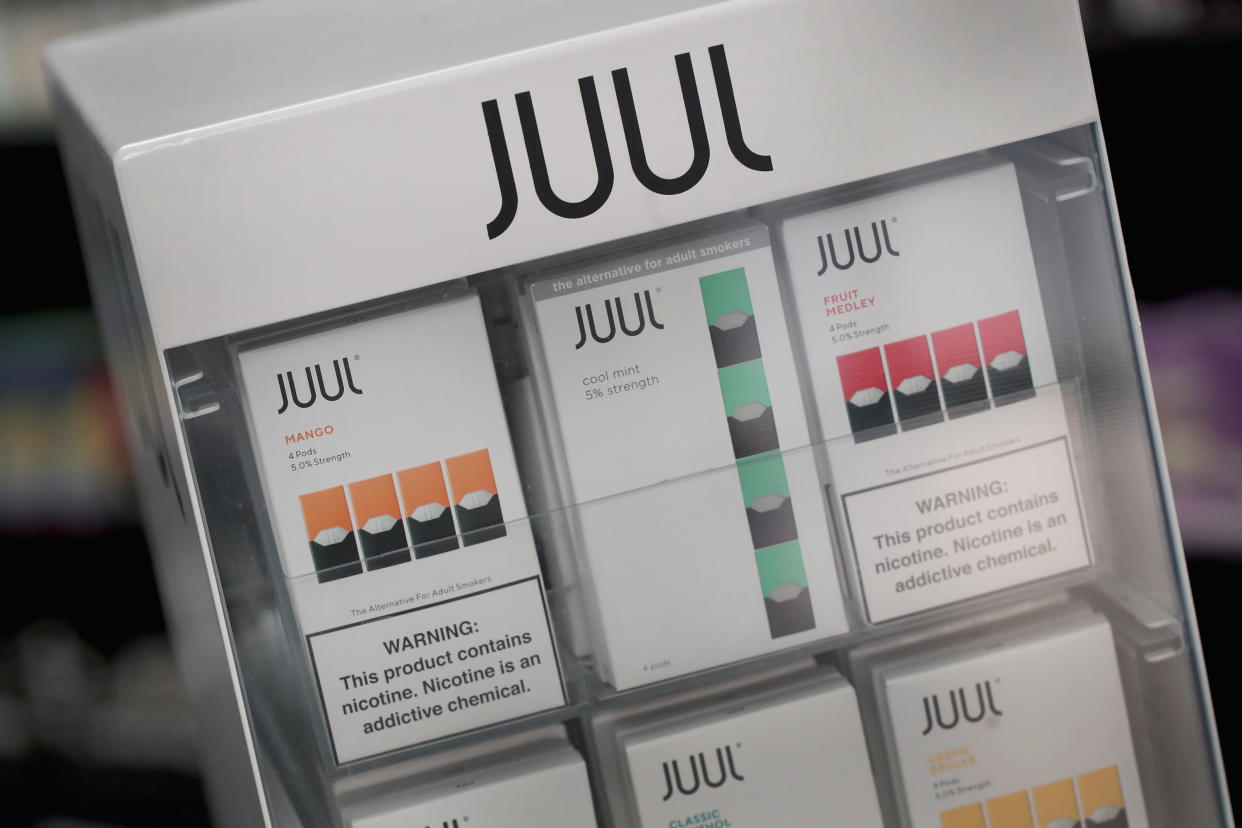CDC reports 52 percent increase in vaping-related illnesses amid shakeup at Juul

It’s been a big week for Juul — and not necessarily a good one. Amid a criminal probe into the e-cigarette maker’s marketing tactics and a Centers for Disease Control and Prevention (CDC) investigation into vaping health effects, the company announced Wednesday that its CEO was immediately stepping down.
The company, reportedly valued at $38 billion, is one of the fastest-growing startups in history. In a statement posted to its website, Juul said current head Kevin Burns will now be replaced by K.C. Crosthwaite, a former Altria executive, who has advised the company to “suspend all broadcast print and digital product advertising in the U.S.” in response to concerns about their marketing tactics.
The news follows months of reports about a “severe lung illness” related to e-cigarettes and THC vaping products, an epidemic that began with eight hospitalizations in Wisconsin this August. The CDC launched an official tracking system shortly after, recording over 200 cases by the end of August. Since then, the caseload has soared. Last week the CDC recorded 530 cases in total, a number that jumped 52 percent to 805 cases this Monday. While the majority affected have been released from the hospital, doctors have linked the illness to 12 deaths.
While experts have yet to pinpoint a specific type of e-cigarette or THC vaping product that’s fueling the illnesses, there are clear on the risks associated with Juul. Lawmakers explored these further in an emergency hearing held by the House Oversight and Reform Committee this week.
During it, principal deputy director of the CDC, Anne Schuchat, PhD, described one of the lesser-known ingredients in Juul, one of what’s known as “fourth-generation” e-cigarettes. “Juul products use nicotine salts, which can lead to much more available nicotine,” Schuchat said. “We believe the product can cross the blood-brain barrier and lead to, potentially, more effect on the developing brain in adolescence.”
In a 2015 post on Pax Labs (Juul’s parent company) announcing the release of the product, the company expands on the salts. “Unlike other e-liquids, JUUL is the only e-cigarette that uses nicotine salts found in leaf tobacco, rather than free-base nicotine, as its core ingredient,” the statement reads.
Pax reportedly patented the nicotine salt technology in 2015, as detailed in a press release in December of that year. “To develop the nicotine salt e-liquid technology, the Pax Labs research team extensively explored the differences in chemical composition between cigarettes and e-cigarettes, demonstrating that the use of nicotine salts instead of free-base nicotine made an unequivocal difference in nicotine blood absorption profiles,” the company said. “Nicotine salts are the natural state of nicotine in the tobacco leaf.”
But while nicotine salt may make for a smoother way to consume the product, experts worry that it also allows much larger amounts of nicotine to be consumed in a short time. A single Juul pod, for instance, contains the same amount of nicotine as an entire pack of cigarettes.
Schuchat says this is especially dangerous for Juul users under the age of 18 — and as many as 56 percent of those who have tried Juul are that age. “The issue is [that] easier access of nicotine to the brain may have a higher risk of leading to ... the learning difficulty, attention problems, memory issues — as well as priming for addiction,” Schuchat told Rep. Raja Krishnamoorthi, the subcommittee’s chairperson. “The brain is pretty central in the issue of addiction, as well as cognitive functioning, and we’re concerned that higher doses of nicotine getting into the brain may lead to larger problems.”
As the hearing came to a close on Tuesday, Schuchat expressed concern that the epidemic — which is primarily affecting those under 25 — will only get worse. “We are seeing more and more cases each day,” she said. “I expect the next weekly numbers will be much higher.”
At the time of publishing, Juul had not replied to Yahoo Lifestyle’s request for comment.
Read more from Yahoo Lifestyle:
FDA links vaping to 127 seizures — expert says e-cigarettes can 'alter' teens' brains
Is vitamin E oil causing vaping-related lung illnesses? New York State Dept. investigates
Follow us on Instagram, Facebook and Twitter for nonstop inspiration delivered fresh to your feed, every day.

